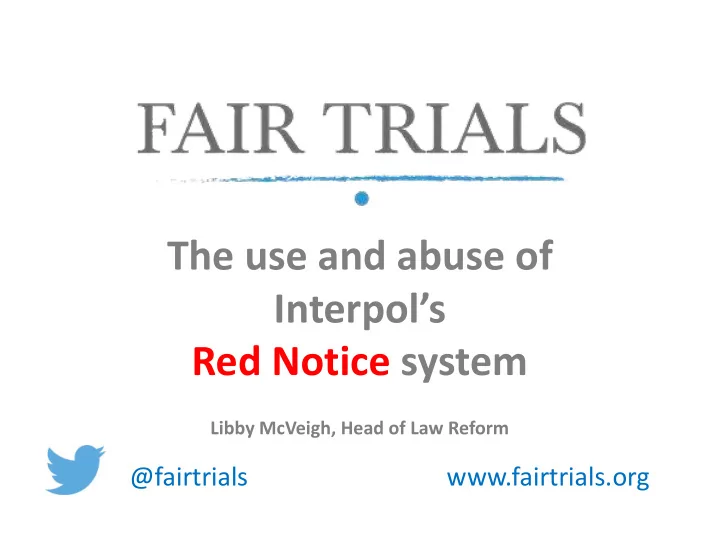

The use and abuse of Interpol’s Red Notice system Libby McVeigh, Head of Law Reform @fairtrials www.fairtrials.org
Our campaign for INTERPOL reform About our work on INTERPOL • Work on 30+ INTERPOL cases since 2011 • Strengthening INTERPOL , Nov 2013 • Meetings with INTERPOL to discuss it • Ongoing campaign for reform
The world in which INTERPOL operates (1) A world of global policing challenges • Organised crime crosses borders easily • Suspects, evidence often located in other countries • INTERPOL helps countries respond to this challenge • Connects police of 190 countries • ‘ Wanted person ’ system to track down fugitives • Exchange of expertise, training, other notices eg. missing persons • Good. Countries need to work together to fight crime!
The world in which INTERPOL operates (2) A world where repression and persecution is common Benny Wenda Indonesia
Interpol – Overview What is Interpol? • Aim: To facilitate international police cooperation • 1956 Constitution – General Assembly; Executive Committee; General Secretariat; Commission for Control of INTERPOL’s files (CCF) - Headquartered in Lyon • National Central Bureaus (NCBs) in each country
Red Notice – Process Red notice – Process: • Enables one country to locate a wanted person in order to have them extradited NCB from the country in which encountered. NCB Interpol Country X Red Arrest Review NCB warrant Notice NCB NCB
Human Impact Human impact • Arrest & detention • Bahar Kimyongür, arrested and deprived of liberty in Spain, Italy and Netherlands (6 months total) • Employment & family life issues • Flight attendant who lost job because of Red Notice • Restricted freedom of movement • Benny Wenda, unable to travel to carry out advocacy activities • Reputational harm • Patricia Poleo, award-winning Venezuelan refugee journalist
INTERPOL’s Rules Justification: the rules • Rules on the Processing of Data (2012) • Exhaustively listed purposes for using INTERPOL • De minimis criterion: 2 years / 6 months • Constitution • Respect for human rights – Article 2 • Exclusion of political cases – Article 3 • Rules look good on paper • Some issues arising in interpretation and application
Quantity not quality?
Detecting and Preventing Abuse Key issues: (1) Interpretation of Article 3 – disconnect between domestic approaches in asylum/extradition proceedings and INTERPOL’s approach. (2) Review of Red Notice requests – unclear what this involves; we know that the arrest warrant is not required. (3) Continuing review – failure to act upon receiving information regarding extradition refusals and asylum grants.
Effective remedies Clearly a need for an effective remedy, but: (1) Absence of effective remedy at national level (2) INTERPOL’s immunity from judicial oversight (3) Inadequacy of CCF as an avenue of redress • Started as a data protection body • Now performing an important human rights role • Petr Silaev • Fair Trials: 28-page application (asylum / extradition / human rights arguments and extensive evidence) • CCF asked questions of Russian NCB – not seen … • CCF response: 1-page response - no reasoning / explanation of approach taken, relied on Russian material which had not been seen by Petr
CCF Budget CCF Annual Budget (2010- 2012) Total Operating Income (2012)
CCF Reform Our recommendations for CCF reform • Create a separate chamber for complaints • Clear, mandatory time-frames • No reliance on evidence not seen by individual • Binding, reasoned decisions (CCF agrees) • Publication of decisions (with safeguards) • Possibility to challenge adverse decisions
International responses
International responses Joint MEP letter November 2013 Commission responds December 2013
Moving in the right direction? INTERPOL developments: New Secretary-General – keen to demonstrate that our concerns have been taken on board, including enhanced measures in relation to compliance checks before any Red Notice is published or visible to member countries. New Chair of CCF – Nina Vajic, former ECtHR judge. Working group established - to conduct ‘ a comprehensive review of INTERPOL’s supervisory mechanisms at all levels, including National Central Bureaus, the General Secretariat and CCF’ .
Thank you for listening! libby.mcveigh@fairtrials.net
Recommend
More recommend